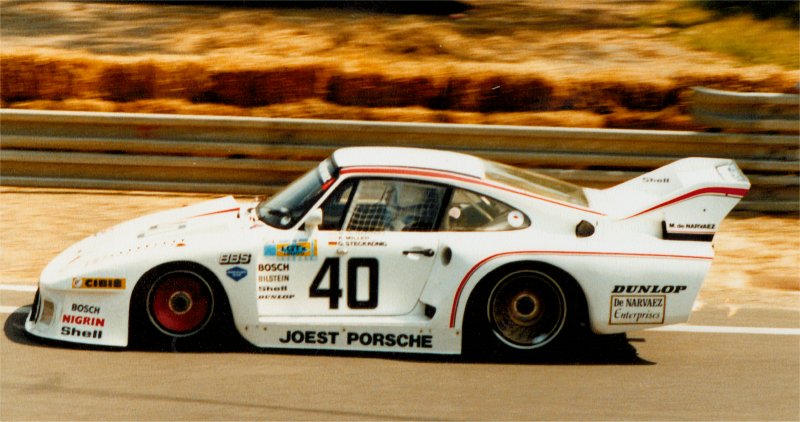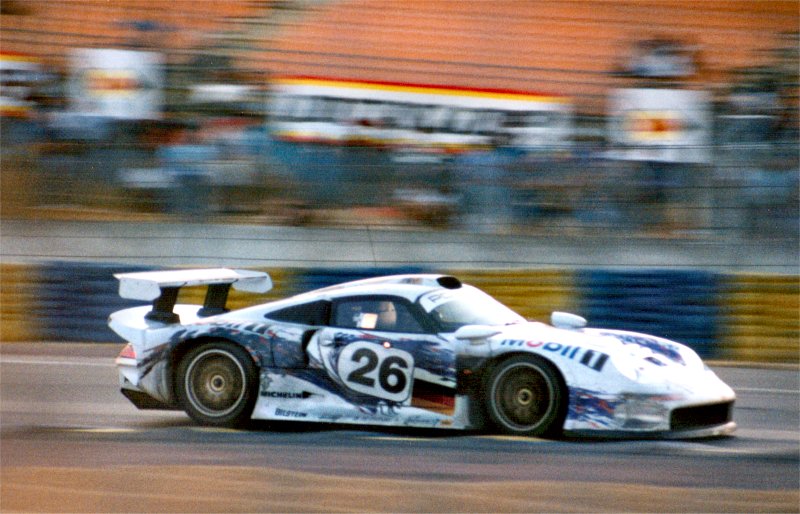



|
Not a lot of difference in the cars, eh? They say what goes around, comes around and both these cars dominated the Le Mans 24 hour race - The top one, a Porsche 935, was the winner in 1979 and the lower one is a Porsche 911 GT1 which led until 2 hours before the end of the race in 1997.
So what's the point? Am I a Porsche fanatic? Am I a Le Mans history nut? Well, no and well, perhaps...
During an Economics class, at the tender age of 17, a school mate (Where are you now, Brian Mitchell?) and I wondered what it would be like to visit the greatest race in the world. I'd never been to a motor race in my life (and I doubt Brian had), but the seed was sown and I found out that the local coach company were running a trip to the race. I was going!
My dad decided to come, too (I suspect at my mother's prompting. She seemed to think a trip to France was not the thing for a 17 year lad to do alone - I wonder why?) and we set off to our first ever motor race.
The 1979 Le Mans 'Vingt-Quatre Heures Du Mans" was probably the most dramatic race I've ever been to. Maybe it was because it was the first, but imagine this as a TV soap plot :-
Too far fetched for words? Nope, that's exactly what happened!
There were times, and now too many to count, when I huddled in a little shelter from the torrential rain in 1979 and thought maybe I wouldn't go again and in 1980 (when local man, Jean Rondeau, won the race in his own make of car to the delight of the French), when it rained for virtually the whole race, I did vow never to go again, but...
Something drags us back year after year after year and 1998 will see the 20th anniversary of that first visit to the Le Mans 24 Hours. I've made it to all of those races and my Dad's only missed one (due to pesky computers!).
1980 was the first year we travelled on our own. We took my Triumph 1500 TC (I later found out I wasn't supposed to drive in France until a year after I passed my test, but that's well in the past now!) and, aside from a couple of stops to strip down one of the SU carburettors to stop it flooding the engine with fuel and the rain, we had a great time.
1981 was one of the seemingly endless number of races which those pesky cars from Stuttgart with the Beetle engines won, but was, as I recall, very hot.
1982 was the beginning of the Group C era. In a way the 1980 Rondeau (built to special Le Mans regs) was the first Group C winner, but Porsche bought along the 956 and started to dominate the blossoming category.
1983 was another Factory Porsche whitewash, but 1984 saw the team withdraw in a spate with the FIA over fuel tank sizes (as I recall). The Joest Porsche team took victory with their 956 and then went on to rub the factory's nose in it the following year by repeating the feat. OK a Porsche won, but this was almost unheard of!
1986 was a 'business as usual' race with the works 956s taking the race, but saw a new face on the scene. Well, I say new. Jaguar had been to Le Mans before in the 50s and were as dominant then as Porsche were in the 1980s, but that was history. The first attempt at Le Mans by the Jaguars was brave, and then in 1987 the cars were specially built to take on the long and fearsomely fast Mulsanne straight (now broken up by chicanes).
In 1988, came the moment that most of the British fans, including me, had been waiting for. In an exciting race, the Jaguars beat the Porsches. It seemed to be a more popular occurence than even the Brits expected, as the roads back to the ferry ports were lined with French people cheering and waving Union Jacks at every British car that passed. It was 1945 all over again!
1989 was a reversal of fortunes for the British and, it seems, the French as the Stuttgart gang rolled over the race, but this time in the form of those dreary Silver Arrows from Mercedes.
1990, however, was a good year as Jaguar did it again, although this was to be the last race for the XJRs.
1991 saw a popular and emotional (for the Japanese, at least) win for Mazda. Apparently Mazda increased sales of road cars by over 30% on the strength of this win and were, historically, the first Japanese manufacturer to win Le Mans. To date, they remain the only one, despite expensive and, sometimes, desperate attempts by Toyota and Nissan. My wife came with us that year, and again a couple of years later, although the arrival of the little Saxby's have restricted her to just the two events.
1992 gave the French something to really cheer about for the first time since 1980, when the Peugeots defied the odds and got a 3.5 litre, F1-alike Group C car to the finish. They repeated the feat the following year, narrowly defeating a strong challenge from the similar Toyota, but by now Porsche, Mercedes and Jaguar had gone and the expensive regulations and a complete lack of understanding by the governing body of the nature of sportscar racing, led to the demise of Group C later that year.
Le Mans, however, is bigger than the any particular regulations and they launched their own GT regulations. Sadly, Porsche saw fit to ignore the spirit of the rules and fielded a Porsche 962 on thin wheels against Lotus Esprits, Venturis and the like, it was no contest. Sometimes, you have to wonder, as now with the GT Mercedes, if some manufacturers don't suffer by being too keen to win at any price - I'd certainly never buy a Mercedes (Note : Review this section when you retire).
In 1995, the BPR had a flourishing GT series running, without Group C cars, and Le Mans saw a good battle between the open top sports prototypes and the McLaren F1 supercars, with the GTs coming out on top. The press tried to excite the British interest, but McLarens just seem to defy nationalism and most people couldn't get too excited about it being a British win. Even the French kept their Union Jacks in the drawers. I travelled a round trip of about 1500 miles to get to Le Mans in 1995, being resident in Munich at the time, but it takes more than a few miles to keep me from the annual pilgrimage and at least I saved on the ferry bill!
In 1996, two amazing things happened. Firstly, I took my 1969 Marcos to Le Mans and, aside from a puncture which needed assistance from a breakdown recovery services, it got me there and back without problem.
Secondly, Porsche lent a stillborn prototype sportscar to Joest in the hope of it providing backup to their works GT1 cars. This car had, remarkably, started life as a Jaguar! Later it arrived at Le Mans as a Mazda and then went to race in the World Sports Car series in the USA. Regulation changes saw it withdrawn and seemingly set for a quiet life in a museum until it arrived at Le Mans in Joest's hands and promptly won the race ahead of the two works Porsche GT1s.
If that was embarassing, 1997 was a disaster as Joest wheeled out 'old faithful' and promptly beat the GT1s again, although this time the factory's drivers and reliability let them down, rather than a lack of outright pace.
1998 beckons and we will, all things being equal, be there to cheer or politely clap whoever crosses the line first.
Now if I can just hold out until I'm my Dad's age, I can do the 50!!!!
